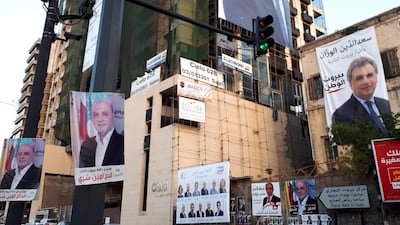The beneficiaries of Lebanon’s politics have always been its politicians; ordinary people have rarely been served by it. This fact was amplified in 2013 when lawmakers endorsed, after discussions that lasted no more than minutes, a proposal to postpone parliamentary elections that were due to take place that year. Political gridlock at home and the unfolding civil war in Syria, cited as the chief reasons for the suspension of elections, did not make the spectacle any more palatable.
On Sunday, Lebanese voters will finally get the chance to participate in an election. In the nine years since the last vote was held, the fragile political arrangement that has preserved Lebanon since the end of the civil war has been irreparably damaged by Hezbollah, the militant Shiite organisation that functions as a state within a state, and its backers in Iran. Hezbollah has sent thousands of fighters to prop up the Syrian regime of Bashar Al Assad, whose bloodlust, in turn, has sent 1.5 million Syrians streaming into Lebanon for sanctuary. Lebanon finds itself in an intractable position: it is sinking under the burden of integrating Syrian refugees, but there can be no reprieve until there is peace in Syria – and peace won't arrive as long as Hezbollah and Iran abet Mr Al Assad.
Last year's drama surrounding Saad Hariri – who resigned during a visit to Saudi Arabia as Lebanon's prime minister and then changed his mind on returning to Beirut – has only weakened the hand of the anti-Hezbollah forces. They are fragmented, while Hezbollah remains singularly focused on multiplying its strength. The group's leader, Hassan Nasrallah, has openly appealed for "political protection" in the form of votes. And such is the brazenness of Hezbollah that it has even fielded Jamil Al Sayyed, a dreaded former chief of Lebanon's intelligence and a tool of Mr Al Assad, as a candidate.
While malign men abound, women are rare on the electoral lists of mainstream parties such as the Future Movement, the Lebanese Forces, the Kateeb and the Free Patriotic Movement. There are just four women in Lebanon's parliament; each is connected to powerful political families. This year, professional Lebanese women have advanced themselves as candidates on a civil society list unaffiliated with any of the established parties. Lebanese voters have a rare opportunity not only to send a powerful message to the entrenched and entitled androcracy but also to elect genuinely competent candidates. Sunday's election, though long overdue, appears unlikely to produce a radically altered political landscape. Hezbollah is expected to make gains, but Mr Hariri will probably retain power. The energetic citizenly engagement in the democratic process by Lebanon's long neglected voters currently on display reveals the dispiriting gulf between the rulers and the ruled. They deserve a government they will not get on Sunday.

